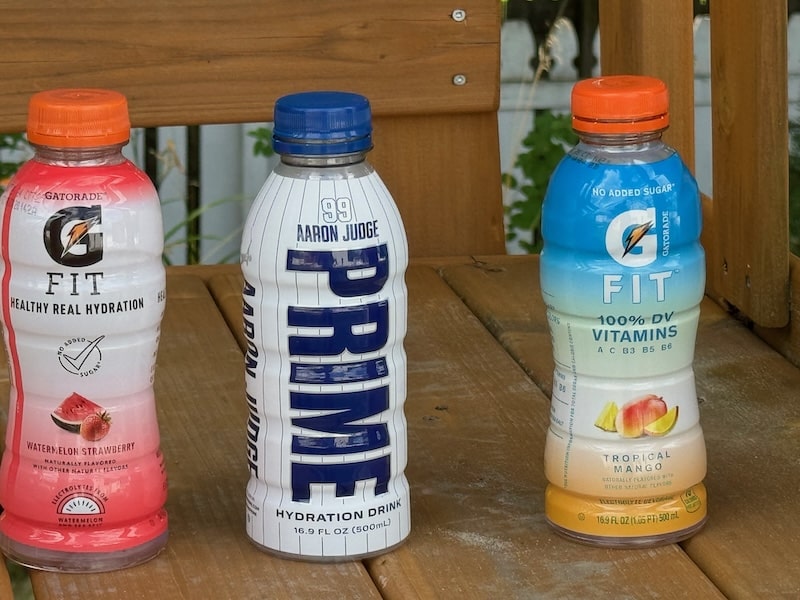Gatorade vs Prime: Is Prime Healthier Than Gatorade?
Prime vs Gatorade:
Which sports drink should you choose?
I know that comparing Gatorade vs Prime and choosing the healthier option is a common question for kids, athletes, and adults, and that’s why I’m here to help!
Water is the MVP of hydration drinks and should always be your first choice. However, if you’re reaching for a sports drink, comparing Prime vs Gatorade is important to help you find the healthiest option.
In the past, during my high school and college days, I relied on Gatorade to keep me going through grueling practices and tough matches.
However, I am happy that there are more low-sweetener, low-calorie, natural sports drinks available now.
I was skeptical of Prime Hydration because the marketing made it seem like a cheesy gas station beverage, but I was happy to find out that Prime beverages are quality, low-calorie hydration beverages that kids and adults can drink.
Although I strongly people to rely on water as their primary hydration drink of choice, I understand that many people want something with a bit of flavor, electrolytes, and carbohydrates to get them through their workouts or competitions.
That said, let’s examine some of the most important aspects and significant considerations of Gatorade vs Prime hydration beverages to determine which one is the healthier option!
Prime vs Gatorade: Initial Overview
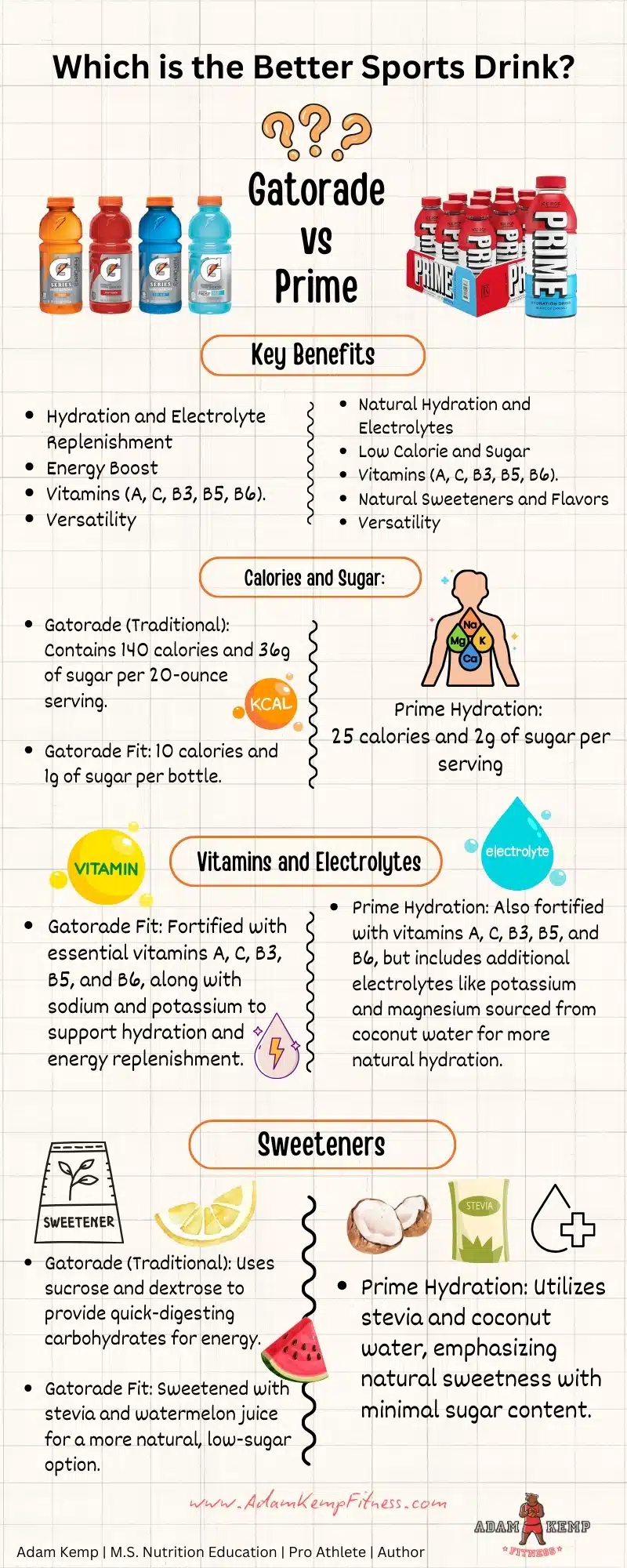
Gatorade and Prime Hydration take different approaches to meeting your hydration needs.
Gatorade’s decades-long reputation appeals to athletes, while Prime’s newer, lower-calorie formula prioritizes natural ingredients for a modern take on sports hydration.
Let’s compare their ingredients and see which of these sports drinks actually provides the hydration support you want and need.
Key Benefits of Gatorade
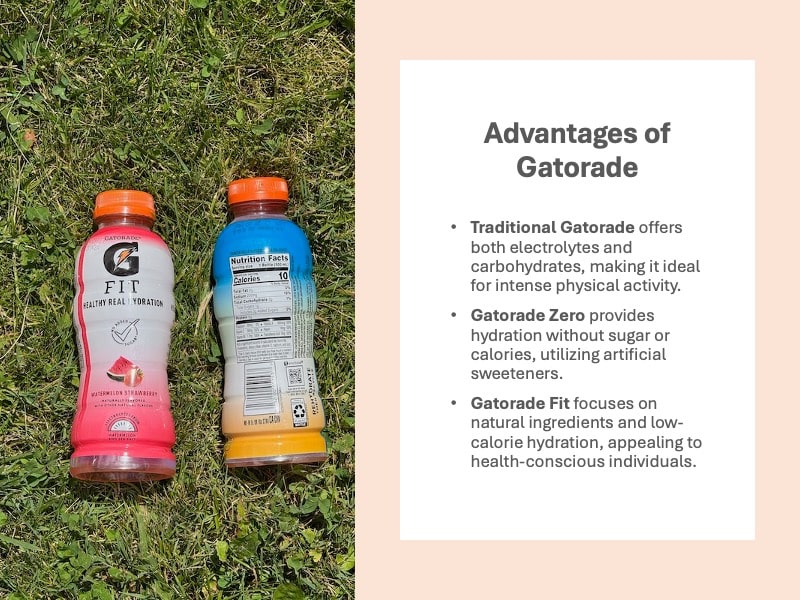
Since its launch in 1965, Gatorade has established itself as a staple in the sports beverage world, specifically designed to help athletes replenish electrolytes and fluids lost during intense physical exertion.
The brand offers a diverse range of products, including traditional Gatorade, Gatorade Zero, and Gatorade Fit, each tailored to different hydration needs.
The original Gatorade formula combines electrolytes and carbohydrates to provide quick energy and hydration, with about 140 calories and 36 grams of carbohydrates per 20-ounce serving.
For those seeking hydration without the extra calories, Gatorade Zero uses artificial sweeteners like sucralose and acesulfame potassium to deliver electrolytes without added sugar or calories.
The most recent addition, Gatorade Fit, takes a more natural approach, featuring ingredients like watermelon juice and sea salt for hydration, with just 10 calories per bottle and minimal sugar.
A few key benefits of drinking Gatorade include:
- Hydration and Electrolyte Replenishment: Effective for intense workouts with sodium and potassium.
- Energy Boost: Quick energy from carbohydrates (sucrose and dextrose).
- Vitamins: Gatorade Fit includes essential vitamins (A, C, B3, B5, B6).
- Versatility: Suitable for various activity levels and age groups with different product options.
Last update on 2025-05-09 / This article includes affiliate links/Images via Amazon Product Advertising API. I may earn commissions on purchases made through these links.
Key Benefits of Prime Hydration
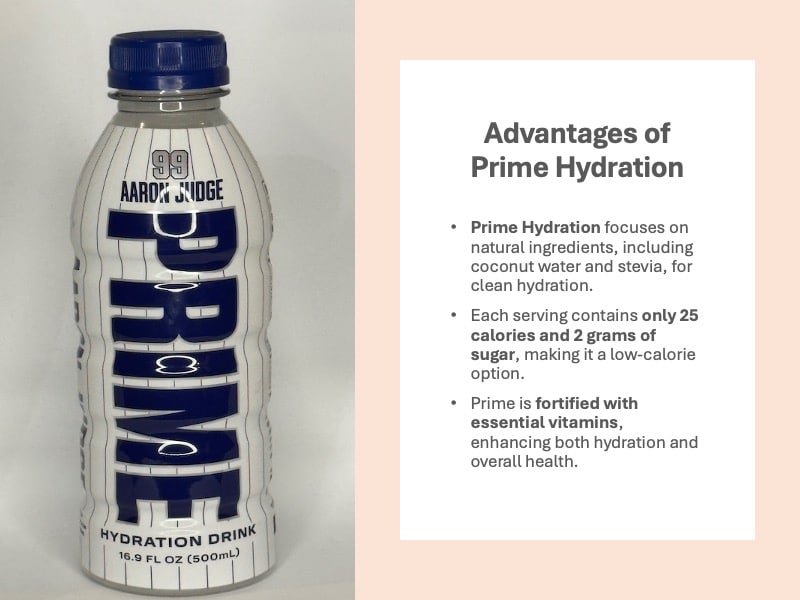
Prime Hydration, a relative newcomer to the sports drink market, has quickly gained popularity due to its influencer support, focus on natural ingredients, and appealing taste.
Offering flavors like Blue Raspberry, Tropical Punch, and Lemon Lime, Prime emphasizes clean and nutritious hydration, making it an enjoyable option for health-conscious consumers.
- Prime Hydration’s formula includes coconut water, a natural source of electrolytes such as potassium and magnesium, which aids in hydration and recovery.
- Instead of traditional sweeteners, Prime uses stevia leaf extract, keeping the calorie count low without sacrificing flavor.
Each serving contains about 25 calories, 2 grams of sugar and is fortified with essential vitamins A, C, B3, B5, and B6, making it a comprehensive option for maintaining hydration and overall health.
- Natural Hydration and Electrolytes: Coconut water provides potassium and magnesium.
- Low Calorie and Sugar: Only 25 calories and 2g sugar per serving.
- Vitamins: Includes essential vitamins (A, C, B3, B5, B6).
- Natural Sweeteners and Flavors: Uses stevia and coconut water, avoiding artificial additives.
- Versatility: Suitable for various age groups and activity levels with a focus on natural, health-conscious hydration.
Last update on 2025-05-09 / This article includes affiliate links/Images via Amazon Product Advertising API. I may earn commissions on purchases made through these links.
Nutritional Comparison: Is Gatorade or Prime Healthier?
Gatorade and Prime Hydration each offer distinct nutritional profiles designed to support hydration and overall health.
Types of Sweetener Used
- Gatorade (Traditional): Uses sucrose and dextrose to provide quick-digesting carbohydrates for energy.
- Gatorade Fit: Sweetened with stevia and watermelon juice for a more natural, low-sugar option.
- Prime Hydration: Utilizes stevia and coconut water, emphasizing natural sweetness with minimal sugar content.
Calories and Sugar
- Gatorade (Traditional): Contains 140 calories and 36g of sugar per 20-ounce serving, providing quick energy during intense physical activity.
- Gatorade Fit: A low-calorie option with only 10 calories and 1g of sugar per bottle, catering to those seeking hydration with minimal caloric impact.
- Prime Hydration: Offers a middle ground with 25 calories and 2g of sugar per serving, making it a lower-calorie alternative with natural ingredients.
Vitamins and Electrolytes
IMPORTANT: It’s important to note that both Prime Hydration and Gatorade Fit contain 100% of the RDA for Vitamin A per serving, so consuming more than one per day could lead to excessive Vitamin A intake, which may result in toxicity and adverse health effects over time.
- Gatorade Fit: Fortified with essential vitamins A, C, B3, B5, and B6, along with sodium and potassium to support hydration and energy replenishment.
- Prime Hydration: Also fortified with vitamins A, C, B3, B5, and B6, but includes additional electrolytes like potassium and magnesium sourced from coconut water for natural hydration.
Pros & Cons – Prime vs Gatorade
Gatorade
Pros
- Gatorade is a trusted choice for athletes engaging in high-intensity and endurance sports.
- Its blend of electrolytes and carbohydrates provides quick energy and supports recovery.
- With a wide range of flavors and easy availability, Gatorade is convenient for regular hydration.
- Additionally, Gatorade Fit offers a low-calorie, health-conscious option with added vitamins for those seeking a lighter alternative.
Cons
- The high sugar content in traditional Gatorade can contribute to excessive calorie intake, potentially leading to health issues such as obesity and diabetes.
- Its use of artificial additives and large-scale production also raises concerns about environmental impact and overall health.
- Additionally, some find the taste of Gatorade Fit inferior to natural low-calorie options like Prime Hydration.
Last update on 2025-05-09 / This article includes affiliate links/Images via Amazon Product Advertising API. I may earn commissions on purchases made through these links.
Prime Hydration
Pros
- Prime Hydration stands out with its focus on natural ingredients, low calories, and reduced sugar, making it an appealing option for daily hydration and health-conscious individuals.
- Fortified with essential vitamins and using natural flavors, Prime offers a cleaner, more refreshing taste without artificial additives.
- Additionally, Prime Hydration is good for kids due to its low sugar content, natural ingredients, and essential vitamins, offering a healthier hydration option without artificial additives. However, you need to watch out for its vitamin A content.
- Its smaller production scale and emphasis on sustainability further enhance its appeal to eco-conscious consumers.
Cons
- The distinct taste of stevia and coconut water may not suit everyone’s palate, and Prime’s lower sodium content may not provide enough electrolyte replenishment for extreme endurance athletes.
- Additionally, Prime Hydration can be less widely available and potentially more expensive compared to Gatorade.
- Prime Hydration contains 100% of the RDA of vitamin A, and consuming more than one per day can lead to vitamin A toxicity.
Are Gatorade and Prime Sports Drinks Necessary for Hydration?
As a professional basketball player and Nutrition Educator, I have extensive experience with various hydration beverages to support my performance and recovery.
In my opinion, hydration is one of the most important aspects of health, fitness, and athletic performance because even a 2% decrease in body water levels can affect performance on tasks ranging from free throws in a professional basketball game to driving a car.
As I spend a lot of time and effort making sure I always consume the best hydration drinks, comparing Gatorade vs Prime is an important topic to me.
I try my best to provide evidence-based, unbiased, and realistic health and fitness advice, so I hope my suggestions are valuable to you.
Gatorade is a long-standing favorite among athletes and offers a range of products designed to replenish electrolytes and provide energy.
On the other hand, Prime Hydration is a newer contender that emphasizes natural ingredients and lower calorie content.
Before we finish comparing Prime vs Gatorade and declare a winner, here are some general hydration tips and information on when you actually need to consume sports drinks and when you should choose water instead, which is the absolute best hydration drink.
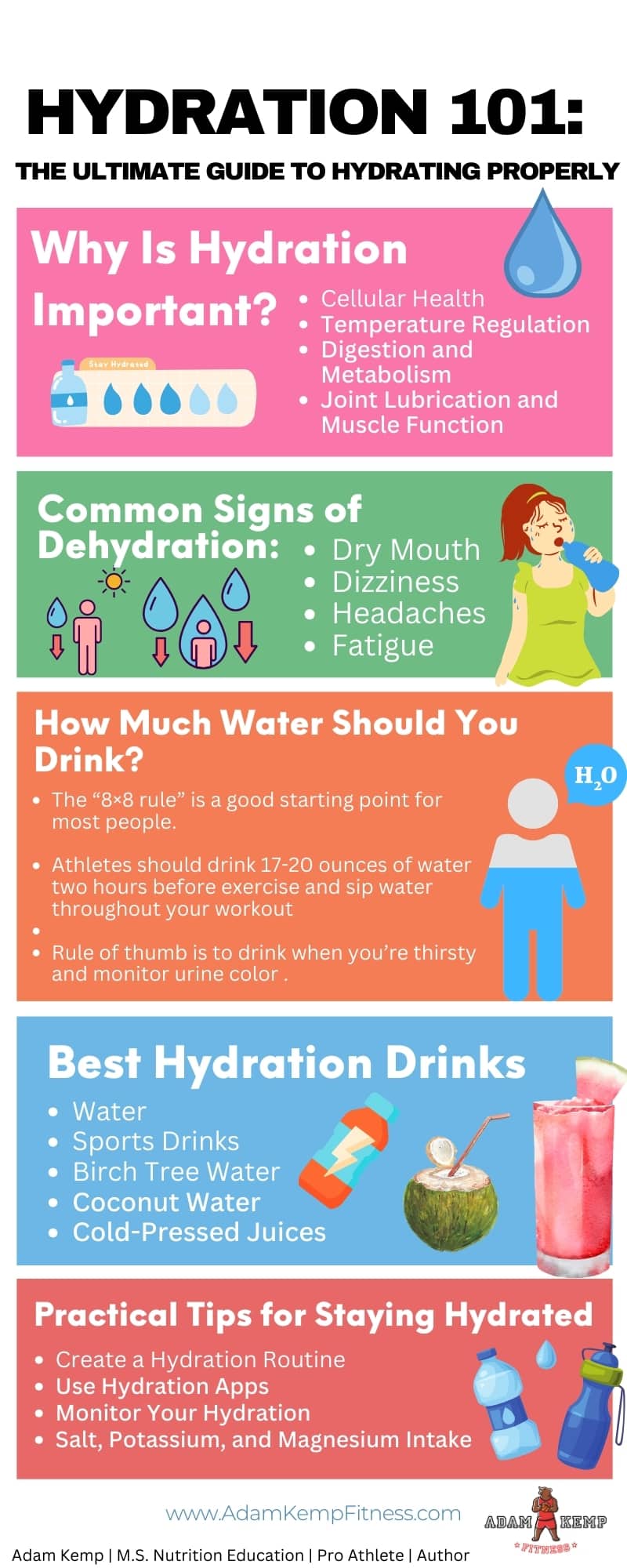
When to Choose Prime or Gatorade
Generally, I don’t believe regular sports drinks like Gatorade or Powerade are ideal for athletes due to their high sugar and artificial sweetener content, which can cause energy spikes and crashes.
Instead, if intra-workout carbohydrates and electrolytes are needed, I recommend a more comprehensive option like Momentous Fuel, which provides balanced nutrition designed specifically for athletic performance and recovery.
However, I do believe low-calorie sports drinks like Gatorade Fit or Prime Hydration are excellent for hydration during moderate to intense physical activity, especially when sweating leads to electrolyte loss.
As I’ll discuss below, the biggest concern with these low-calorie, naturally sweetened beverages is their high vitamin A content, and you should only consume one per day.
These beverages are particularly beneficial for:
- High-intensity training or sports: Activities lasting over 60 minutes, where sweat loss is significant, and electrolytes need to be replenished to maintain performance.
- Hot and humid conditions: When sweat rates are elevated, low-calorie electrolyte drinks can help prevent dehydration and cramping without adding excessive sugar.
- Recovery after exercise: Rehydrating after demanding workouts often requires replacing both fluids and electrolytes, which these drinks provide effectively.
When to Opt for Water Instead of Gatorade or Prime
While electrolyte beverages are beneficial in certain situations, water remains the best choice for hydration during less strenuous activities.
In many situations, sports drinks should be avoided to prevent unnecessary intake of sugars, sodium, or additives.
- Low-intensity exercise or daily activities: For casual workouts, walking, or light physical activity, water is sufficient to maintain hydration.
- Weight management goals: If calorie reduction is a priority and sweat loss is minimal, water can hydrate without contributing extra calories or sweeteners.
- Non-sweating conditions: When exercise is not vigorous enough to cause significant electrolyte loss, water effectively meets hydration needs.
Hydration is not one-size-fits-all.
Gatorade and Prime both serve important purposes in specific scenarios, but for most day-to-day hydration needs, plain water remains the simplest and healthiest choice.
Final Verdict: Is Prime Better Than Gatorade?
Prime Hydration offers a cleaner, lower-calorie alternative to Gatorade, making it one of the best sports drinks and a better choice for general hydration and health-conscious consumers.
Its use of coconut water for natural electrolytes, lack of artificial additives, and significantly lower sugar content make it a more suitable option for everyday hydration and light to moderate exercise.
However, traditional Gatorade remains a superior choice for endurance athletes and those engaging in prolonged, intense workouts due to its carbohydrate content, which provides quick energy.
For those looking for a healthier Gatorade alternative, Gatorade Fit bridges the gap by offering electrolytes and vitamins with minimal sugar.
Ultimately, Prime Hydration is the healthier option for most people, especially kids and non-elite athletes, due to its natural ingredients and reduced sugar.
But for athletes who need rapid energy replenishment during high-intensity sports, Gatorade—particularly the original formula—remains a proven performance drink.
Last update on 2025-05-08 / This article includes affiliate links/Images via Amazon Product Advertising API. I may earn commissions on purchases made through these links.
Read Next: Best Hydration Tips for Athletes

